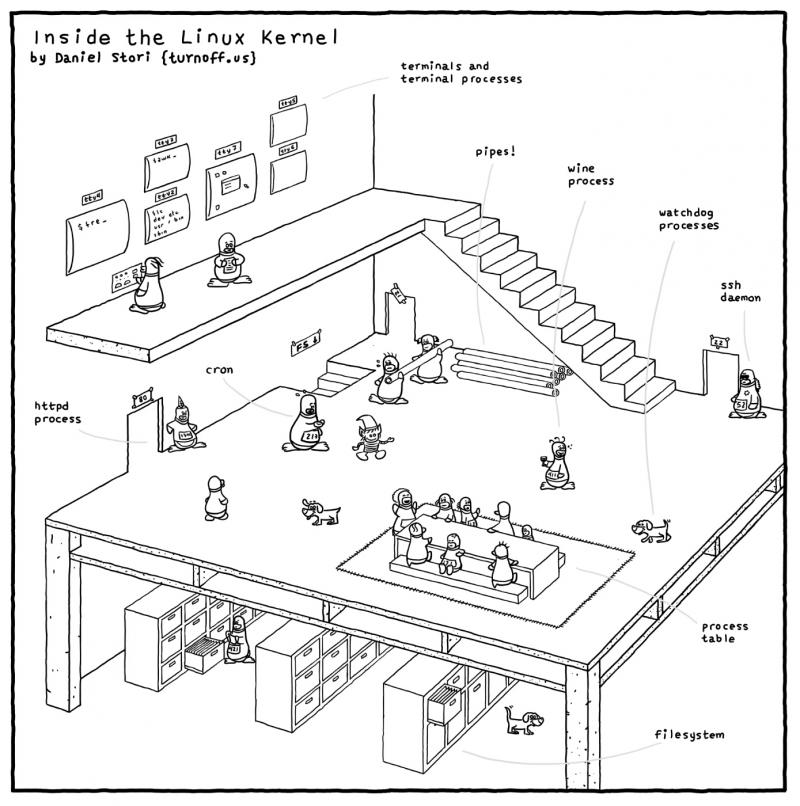Details
-
AboutGame developer at Exient
-
Skillsc++, c# specialising in networking and graphics.
-
Github
Joined devRant on 6/6/2016
Join devRant
Do all the things like
++ or -- rants, post your own rants, comment on others' rants and build your customized dev avatar
Sign Up
Pipeless API

From the creators of devRant, Pipeless lets you power real-time personalized recommendations and activity feeds using a simple API
Learn More
-
Best office prank: I was pretty young and naaive. Senior dev comes to me and says that it would be hilarious to slide a note under the women's bathroom door saying, "I know what you're doing in there". He says that the woman in there will think it's hilarious too. We work with her, she's very funny and laid back, so I go along with it, expecting to get a laugh. A few minutes go by and a different older women enters my cube. She's got the note! She works on the other side of the building so I don't know her too well but I can tell from the look on her face that she's pissed. I'm frozen with fear as my career flashes before my eyes.
I apologise perfusely and try to explain but she's not having it. After a while she goes back to her office not having accepted that it wasn't meant for her and that it was just a joke gone wrong. I spend the next two days apologizing every chance I get, hoping she won't go to HR. She remains stone cold until late on the second day. She couldn't take it anymore as her mouth reluctantly begins to crack a smile. At that point she drops the serious expression on her face and busts out laughing.
It turns out that the three of them planned the whole thing and executed flawlessly. I've never felt so relieved to be the butt of a joke.7 -
This story is 100% true.
I got hired onto a team of construction workers to build a house. We set up a meeting with Management to find out what kind of house they wanted us to build, where’s the floor plan, what it’s going to be used for, who it’s for, etc. Management said that they didn’t know all that, we should just get started. They told us that we were going to use “Agile” which means that we just work on small deliverables and build the thing incrementally.
The developer team lead argued that we at least need to know how big the thing is going to be so that we can get started pouring the foundation, but Management told him they just don’t know. “What we do know,” Management said, “is that the house is going to have a bathroom. Just start there, and we’ll know more when it’s done. You have two weeks.”
So we just bought a port-a-potty, and screwed around on the internet for two weeks. Management was outraged. “You call this a house? This is the worst house ever! It doesn’t even have a tv!”
So we bought a tv and put it in the port-a-potty, attached to an outdoor generator. We were going to buy a a dvd player and get it hooked up to cable, but Management rejected the expense request, saying that they didn’t know if we needed it, and we’d come back to that later.
Management decided that we definitely need storage space, so we bought a boxcar and duct-taped the port-a-potty to it. Then to our horror they set up some desks and put a few miserable business interns in there. It went on like this…
After a few years the boxcar grew into a huge, ramshackle complex. It floods, leaks, it’s frozen in the winter and an oven in the summer. You have to get around in a strange maze of cardboard tubes, ladders and slides. There are two equally horrible separate buildings. We’re still using just the one outdoor generator for all power, so electricity is tightly rationed.
Communication between the buildings was a problem. For one of them, we use a complex series of flag signals. For the other we write notes on paper, crumple the paper up, and toss it over. Both of these methods were suggested as jokes, but Management really liked them for some reason. The buildings mostly talk to each other but they have to talk through us, so most of what we do is pass messages on.
It was suggested that we use paper airplanes instead of crumpled up balls, but the fat, awkward fingers of the Business Majors who inevitably take those jobs couldn’t be trained to make them. I built an awesome automatic paper airplane folder, but once again they couldn’t be trained to use it, so they just went back to crumpling the notes up in balls.
The worst part of all this is that it’s working. Everyone is miserable, but the business is making money. The bright side is that this nightmare complex is done so now we know what kind of building they actually needed in the first place, so we can start work on it. Obviously we can’t tell Management anything about what we’re doing until it’s finished. They noticed the gigantic hole in the ground where the foundation is coming in, but we told them that it’s a cache reset, and they mostly ignore it except when the occasional customer falls in.
I’ll probably be out of here before the new building gets finished. I could get a 50% raise by switching jobs, but Management still doesn’t think I should get a raise because I missed a couple sprints.7 -
🎶 He's making a list
He's testing it twice
SELECT * FROM users WHERE behavior="nice"
SQL-clause is coming
To town. 🎶16 -
!rant
After over 20 years as a Software Engineer, Architect, and Manager, I want to pass along some unsolicited advice to junior developers either because I grew through it, or I've had to deal with developers who behaved poorly:
1) Your ego will hurt you FAR more than your junior coding skills. Nobody expects you to be the best early in your career, so don't act like you are.
2) Working independently is a must. It's okay to ask questions, but ask sparingly. Remember, mid and senior level guys need to focus just as much as you do, so before interrupting them, exhaust your resources (Google, Stack Overflow, books, etc..)
3) Working code != good code. You are an author. Write your code so that it can be read. Accept criticism that may seem trivial such as renaming a variable or method. If someone is suggesting it, it's because they didn't know what it did without further investigation.
4) Ask for peer reviews and LISTEN to the critique. Even after 20+ years, I send my code to more junior developers and often get good corrections sent back. (remember the ego thing from tip #1?) Even if they have no critiques for me, sometimes they will see a technique I used and learn from that. Peer reviews are win-win-win.
5) When in doubt, do NOT BS your way out. Refer to someone who knows, or offer to get back to them. Often times, persons other than engineers will take what you said as gospel. If that later turns out to be wrong, a bunch of people will have to get involved to clean up the expectations.
6) Slow down in order to speed up. Always start a task by thinking about the very high level use cases, then slowly work through your logic to achieve that. Rushing to complete, even for senior engineers, usually means less-than-ideal code that somebody will have to maintain.
7) Write documentation, always! Even if your company doesn't take documentation seriously, other engineers will remember how well documented your code is, and they will appreciate you for it/think of you next time that sweet job opens up.
8) Good code is important, but good impressions are better. I have code that is the most embarrassing crap ever still in production to this day. People don't think of me as "that shitty developer who wrote that ugly ass code that one time a decade ago," They think of me as "that developer who was fun to work with and busted his ass." Because of that, I've never been unemployed for more than a day. It's critical to have a good network and good references.
9) Don't shy away from the unknown. It's easy to hope somebody else picks up that task that you don't understand, but you wont learn it if they do. The daunting, unknown tasks are the most rewarding to complete (and trust me, other devs will notice.)
10) Learning is up to you. I can't tell you the number of engineers I passed on hiring because their answer to what they know about PHP7 was: "Nothing. I haven't learned it yet because my current company is still using PHP5." This is YOUR craft. It's not up to your employer to keep you relevant in the job market, it's up to YOU. You don't always need to be a pro at the latest and greatest, but at least read the changelog. Stay abreast of current technology, security threats, etc...
These are just a few quick tips from my experience. Others may chime in with theirs, and some may dispute mine. I wish you all fruitful careers!229 -
Vim users be like : "It took me 3 months to learn how to actually use Vim and I'm am totally gonna brag about it".9
-
If Internet Explorer is brave enough to ask you to make it your default browser, you're brave enough to ask that girl out.6












